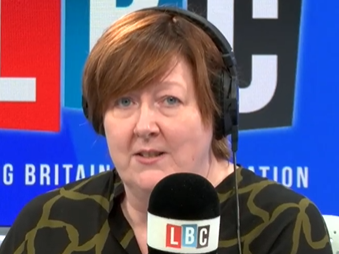
LBC’s Shelagh Fogarty breached broadcasting guidelines by interviewing a representative from Bupa without telling listeners the coverage was paid for by the private healthcare provider.
Broadcast regulator Ofcom has ruled the interview was in breach of rule 10.1 of the Broadcasting Code, which says programming that stems from a commercial agreement should be transparent and appropriately signalled to listeners.
The phone interview took place during Fogarty’s weekday afternoon show on 22 May as part of a discussion on the psychological impact of reality TV.
A listener complained that the questions and responses between Fogarty and Bupa UK’s clinical director for mental health Pablo Vandenabeele “sounded prepared” and like “an advert for Bupa”.
LBC, which is owned by Global Radio, then showed Ofcom the commercial agreement it had with Bupa, which included the broadcast of an interview on its radio station.
The agreement said: “Bupa will have sign-off on each of the interview questions.”
LBC told Ofcom the interview was part of the station’s paid-for “Brand A View” feature for Mental Health Awareness Week, in which a client spokesperson or representative goes on air to give a “newsworthy interview about a topic”.
On this occasion, the script did not included the appropriate signalling normally given at the start and end of each of these interviews.
“In this instance, due to human error… credits were not included in documentation provided to the presenter and were therefore not read out on air,” LBC said.
Both Fogarty and Vandenabeele made references to Bupa’s mental health-related products and services during the interview, which LBC said may have indicated to listeners that there was a commercial agreement in place.
Adding that this was a one-off incident, LBC said: “Global has a thorough and well-established practice of signalling commercial agreements in which all producers and presenters are well-versed.”
The radio station told Ofcom that after it received the complaint, all relevant producers, script writers and presenters were given “written and verbal reminders of the importance of clear signalling of material subject to a commercial arrangement”.
It added that these sections of scripts and briefing documents will continue to be marked in bold.
Ruling that the interview was in breach of the code, Ofcom said LBC had “not used appropriate signalling to ensure the arrangement was transparent to listeners”.
This was despite Ofcom acknowledging both what the station did to stop the same thing happening again, and the fact the content of the interview may have made its commercial nature clear to listeners.
Read the full Ofcom ruling (from page 45).
Email pged@pressgazette.co.uk to point out mistakes, provide story tips or send in a letter for publication on our "Letters Page" blog
